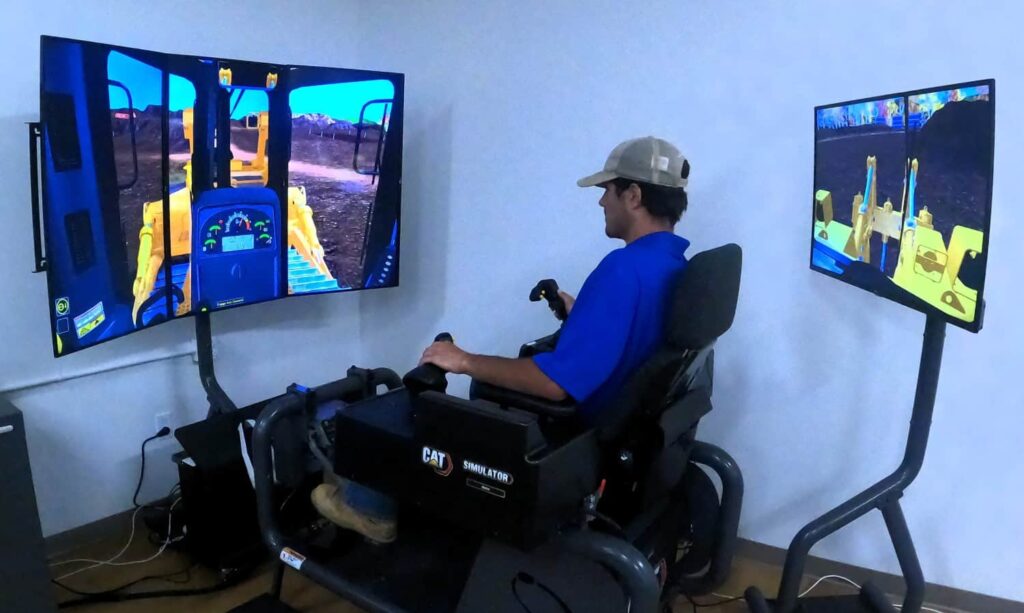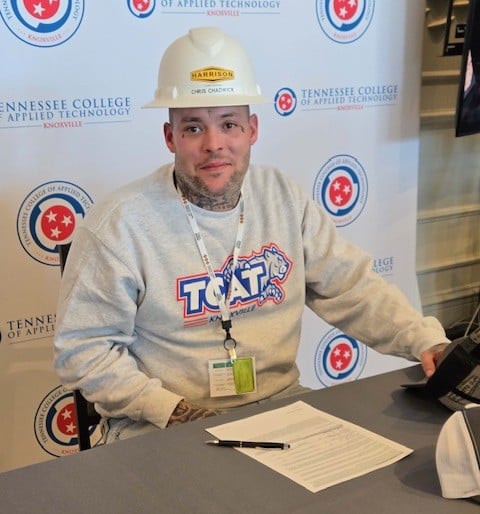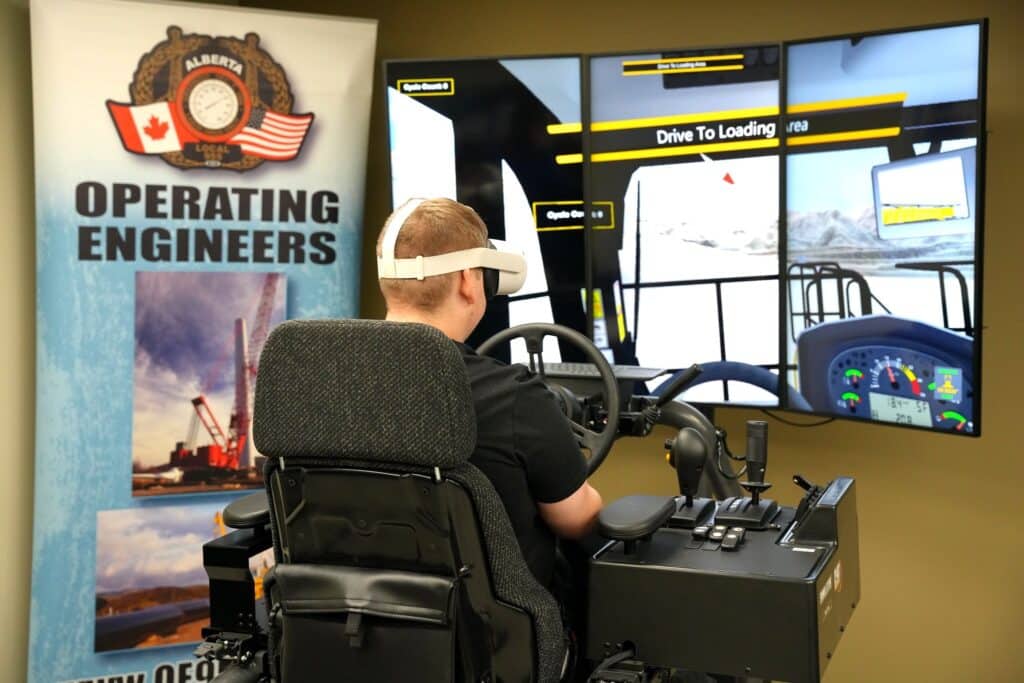Tennessee College of Applied Technology (TCAT) Knoxville began offering Heavy Equipment Operator (HEO) training in 2022 to address the workforce needs of construction businesses and industry and create a valuable new career-training option for the community. Working with area business and industry partners, the college has expanded its HEO training to include an apprenticeship option that is already fulfilling career and workforce needs in the region.
When East Tennessee Turf and Landscape in Morristown, Tenn., needed registered HEO apprenticeship training, the company’s Karen Grogan contacted Apprenticeship TN, an initiative by seven state agencies working together to bolster the number of apprenticeships across Tennessee. She was advised to contact Sally Porter, TCAT Knoxville’s Strategic Impact Coordinator, who had been collaborating with Apprenticeship TN to develop apprenticeship training at the college.
Grogan explained to Porter that the company wanted to hire an operator through a federal grant – but needed to establish an active apprenticeship to qualify for the grant. The two women began working together to develop the college’s three new apprenticeship pathways: Heavy Equipment Operator, CDL Driver, and Labor, which includes industrial electricity and plumbing training.
The college’s established HEO training, which features Cat® Simulators systems, plays an essential role in TCAT Knoxville’s HEO apprenticeship training. “The three-year apprenticeship focuses on training heavy equipment operators using our Cat Simulators, including the Articulated Truck, Dozer, Excavator and Advanced Excavator,” said Porter. She added that students gain valuable experience through hands-on simulator training and instructor-led courses.
Porter explained that students undergo machine safety training that follows the National Center for Construction Education and Research (NCCER) Core curriculum. After completing the safety training, they learn to operate the equipment effectively and safely using SimScholars™ curriculum, designed to match each simulator system. “The training consists of a total of 281.5 class hours, and upon completion, students receive training in OSHA regulations and CPR,” said Porter.
Since the apprenticeship training started, East Tennessee Turf and Landscape has sent two operators through the training. Now, both men work for the company. “They are actually brothers and have worked out great,” said Grogan, who added that TCAT has been phenomenal to work with on the training. “They let us customize it by adding the CPR and flagging training.”

Grogan explained, “As some of our older staff members approach retirement, we will need to hire new employees who are trained and have enough experience with the equipment to step into their roles.”
TCAT Knoxville Partners with TRBA
“We’ve also been working with the Tennessee Road Builders Association (TRBA) to fine-tune our apprenticeship training and to create the Association’s apprenticeship pathway,” said Porter. “We worked with the association to design the course to front load it, which means teaching the safety training and the basics first.”
She emphasized the importance of flexibility in the training schedule because students train on simulators. “We wanted to design the calendar model so that if the student is laid off or the weather is bad, they can use that time to train on the simulators,” explained Porter. “Now, we offer American Traffic Safety Services Association (ATSSA) flagging certification, a four-hour class and MSHA training (Mine Safety Health Association). Their member base can join in and do their apprenticeships with TCAT.”
To participate in the TRBA Apprenticeship Training Pathway, students must be employed by an employer who is a member of the association, like Harrison Construction, located in Knoxville, Tenn.
Harris Construction Estimating Manager Matthew Justice explained that the company sent candidates through the HEO training and then hired them. “They’re learning the fundamentals of operating equipment on the simulators, understanding the motions and the feel of the equipment,” said Justice, who is also on TRBA’s Workforce Committee. “They are also learning what they need to care about, like what’s my fuel burn? What are my cycle times? How am I functioning? What are the metrics that matter when running this piece of equipment?”

Justice pointed out that the simulators allow training to help students become familiar with the equipment without needing a five-acre field or actual machinery. “Several students have come through the training and asked, ‘How am I going to operate an excavator?’ The simulators allow them to experience running an excavator firsthand,” explained Justice.
Becoming an apprentice requires commitment. “We’re looking for candidates who will want to stay in the training,” said Justice. He explained that apprentices may need to complete between 2,000 to 6,000 hours of classroom and on-the-job training depending on the specific job they are training for.
At a recent Tennessee Quality Asphalt Initiative (TQAI) meeting in Franklin, Tenn., TRBA Executive Vice President Kent Starwalt stated, “This apprenticeship training is a crucial step in building a skilled workforce that will drive our industry forward.”
Training Benefits Individuals Changing Jobs, Re-entering Job Force and More
TCAT Knoxville has also partnered with the Tennessee Office of Reentry to provide HEO apprenticeship training opportunities for individuals reintegrating into society after they have been involved with the justice system.
“This training is not just for those fresh out of high school. It’s designed for individuals looking to change careers and for those who may have faced challenges related to the justice system and are looking for a second chance as they re-enter the workforce,” said Justice, adding that one of their employees, Chris Chadwick, is now an apprentice in the TRBA Apprenticeship Pathway.
Jeremy White, from the Tennessee Office of Reentry, said, “Chris Chadwick is a shining example of what can happen for returning citizens when community partners and government work together, and not in silos.”
“Congratulations to Chris and Harrison Construction on this exciting development!” said Kelli Chaney, TCAT Knoxville President, who recognizes the critical need for skilled workers in the construction industry. “We are committed to addressing that need.”

What Does the Future Look Like?
Porter explained that 50 students, including individuals from the Office of Reentry, are enrolled in or have completed the HEO training. She wants to expand the training throughout the area, including high schools, additional TCAT campuses and correctional facilities.
“I would love to expand the training at our other campuses. I’m working on a pre-apprenticeship for high school students with Anderson County,” said Porter. “I would also love to have simulators in the county jails so they could start the training before release.”
“TCAT has done an excellent job of championing the construction industry and finding good quality people who want to grow,” said Justice, who noted that finding people to fill roles in the construction pipeline is becoming increasingly difficult. “We hire on attitude and train the skill. Finding people with the right attitude is key.”
Justice appreciates how the TCAT Knoxville apprenticeship training is helping prepare students to enter the construction industry today and in the future. “The TCAT apprenticeship training is an example of developing training that helps now as well as five, 10 and 15 years down the road. It allows everyone to connect with the construction industry and learn how to become a heavy equipment operator.”





